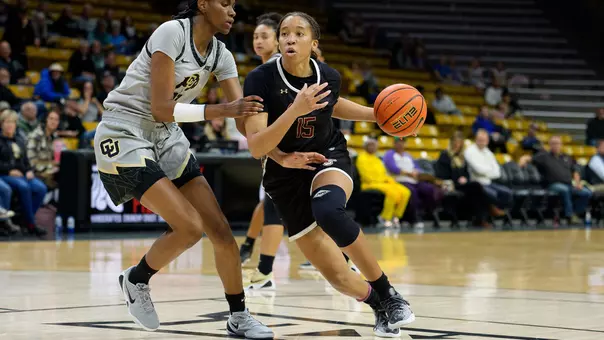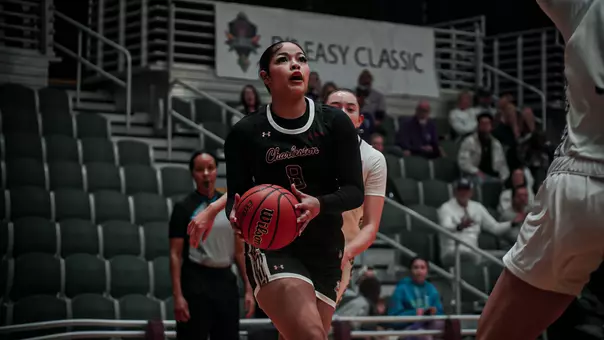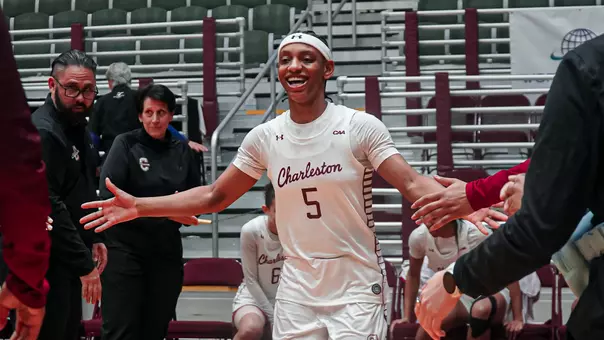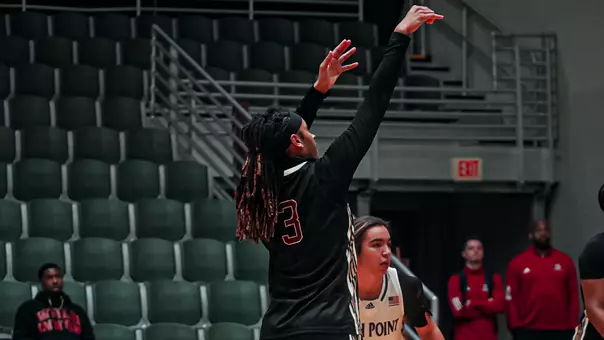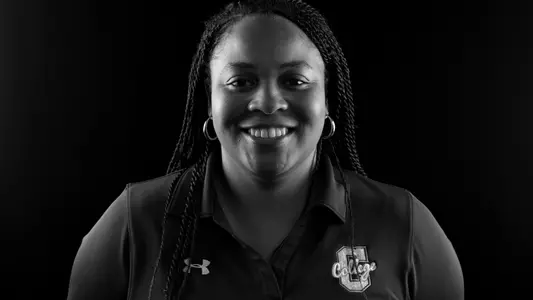
College of Charleston Athletics Year of Women Coach Series: Candice M. Jackson
10/30/2018 6:30:00 PM | General, Women's Basketball
Photo Credits: Marquise Pointer / Athletics Communications Student Intern
NICK VLATTAS
CofCSports.com
Sports have always been a large part of Candice M. Jackson's life. Now, as the head coach of the College of Charleston women's basketball team, she understands the importance of expanding women's roles in athletics and using sports as a platform for women to express themselves and expand their impact.
For Jackson, it's about paying the opportunity forward, and ensuring that future generations of young women have more-and-more opportunities to succeed in basketball—and beyond.
 Growing up in Lansing, Michigan, — the same town as Earvin "Magic" Johnson — Jackson was the youngest of three sisters and muses that her parents, Larry and Teresa, were expecting her to be a boy. But, her parents didn't allow the fact that she wasn't, to negatively impact how they raised her or what opportunities she was afforded.
Growing up in Lansing, Michigan, — the same town as Earvin "Magic" Johnson — Jackson was the youngest of three sisters and muses that her parents, Larry and Teresa, were expecting her to be a boy. But, her parents didn't allow the fact that she wasn't, to negatively impact how they raised her or what opportunities she was afforded.
"From a very young age, I was my dad's boy," she said. "He and I were into all sorts of sports at a very young age. My parents let me play anything: I played soccer, I ran track, I swam, I played softball — you name it. I was extremely competitive."
She recalls a specific occasion when she was playing her older sister, Tracy, in basement basketball — a highly-contested, full-court affair comprised of laundry hampers propped at either end of the basement, and all the intensity inherent in sibling rivalries. The contest ended abruptly, however, when Candice's defensive prowess sent her older sister through the basement wall, although Candice recollects there being no foul on the play.
Not long after — and likely directly because of — the event, a worthy basketball hoop was erected in front of the Jackson home, and from there, the other sports in Candice's life faded away as her love and passion for basketball blossomed.
Though her older sisters were talented basketball players, Candice's primary competitors were the boys around her neighborhood. She certainly enjoyed her time with her girl friends, gallivanting to playgrounds and forging lifelong bonds, but perhaps most impactful were the full days of pick-up basketball against the boys right there in her driveway.
 Her proximity to males in the sport continued to manifest itself as she broke into organized competition, as men coached her at every stage. Starting with AAU and recreational leagues — often coached by her father — up through her high school team — which was coached by an all-male coaching staff of five — Candice didn't know anything but playing under the direction of a male coach.
Her proximity to males in the sport continued to manifest itself as she broke into organized competition, as men coached her at every stage. Starting with AAU and recreational leagues — often coached by her father — up through her high school team — which was coached by an all-male coaching staff of five — Candice didn't know anything but playing under the direction of a male coach.
That is, until she was recruited by legendary coach Joanne P. McCallie, or Coach P to most, at Michigan State University. Jackson would become the first recruit signed by Coach P at MSU, not long after she assumed the program's helm. Coach P and her all-female staff opened Candice's eyes to women's ability to be dominant figures in positions of power.
The opportunity to play for that coaching staff instilled a sense of toughness in Jackson, and it's something she's carried with her throughout her career.
"Woman or not, she is tough," she said. "That's the word I'd use to describe her. At a very early stage in her time at MSU, she set the standards very high. She was a coach that set expectations and would not lower them. You were expected to raise your level to reach the standards or be left behind."
The mentality on which the program was built quickly translated to results on the court. With the program they inherited, the first-year head coach and freshman guard saw the team go 10-18. A year later, they improved to 19-13 and advanced to the semifinals of the Women's National Invitation Tournament, and during her junior and senior seasons, the Spartans went dancing in back-to-back NCAA Tournaments.
Unfortunately, Jackson's playing time was hampered by injuries as she spent large portions of her career sidelined by tears to her meniscus and both ACL ligaments — all occurring from individual, unrelated incidents.
Her time on the sidelines turned out to be well spent, however, as Jackson began to see the game through a coach's lens, which would propel her towards her career.
Driven by a desire to contribute despite injury, she inherited various coaching duties such as tracking stats and assembling opposition scouting reports. Her responsibilities grew steadily over her junior and senior seasons, and afterwards she found herself at a crossroads.
Following another injury-shortened senior season, Jackson elected to pause her pursuit of a master's degree in elementary education and accepted a graduate assistant coaching position at MSU. She retained the dry erase board and markers, but instead of teaching the ABC's, Jackson was now prepared to teach the X's and O's of college basketball.
Jackson was quickly initiated into the grind, and found out what it felt like to go to work everyday doing something you love. She broke down film and took on responsibilities she didn't know existed when she was as a student-athlete, but the most impactful was the opportunity to help her teammates grow.
Despite being an equal peer and teammate months before, the team respected Jackson's position as a coach and a leader.
That season – the 2005 season – the Spartans completed their best season in program history, advancing all the way to the NCAA Tournament Finals and losing to Baylor in the National Championship. The team, after starting the season unranked and virtually unknown, climbed all the way to the Top 5 and earned a No. 1 seed in the tournament, after winning the Big Ten Conference Championship and picking up road wins at perennial powerhouses like UConn and Notre Dame.
"Seeing that team grow the way it did, is something I struggle to describe," Jackson said. "It's a process and it takes work, but it was the best five years of basketball I've ever experienced. It opened my eyes to what's possible."
Jackson parlayed the team's success and recognition into her first full-time job in basketball, coaching at the University of Richmond. At the age off 22, two of the student-athletes on the Spiders' team were older than Jackson, but saw her as approachable and relatable, given her playing experience and having been to the sport's highest level.
"When I talk to young assistants on the road and they're looking for advice, I tell them to assume they're the head coach of whatever they're focused on," she said. "If you're working on recruiting, behave as the head coach of recruiting. If that earns you more responsibility, take it graciously and go be the head coach of the next thing."
 Jackson would spend four seasons at Richmond and two at Wake Forest, before rejoining forces with Coach P, who became the head coach at Duke University in 2007. After three more seasons studying under her coaching icon, the College of Charleston came calling, and it was time to ascend to the head coaching ranks.
Jackson would spend four seasons at Richmond and two at Wake Forest, before rejoining forces with Coach P, who became the head coach at Duke University in 2007. After three more seasons studying under her coaching icon, the College of Charleston came calling, and it was time to ascend to the head coaching ranks.
"Talking to players is different when you're the head coach versus an assistant," Jackson said. "The biggest thing is that I'm modeling the behavior you're asking of them, aside from basketball. As an assistant coach, you're more so a friend, or someone they can go to with their classroom problems, relationship problems, and whatever else.
"But as the head coach, you have to make sure these young ladies are prepared mentally, emotionally and spiritually for whatever comes next in their lives. There's only a slim number of women who are going to go on to play professional basketball. The number is growing, which is great, but we're still years behind the men in that regard.
"For me, I have to make sure they're respectable people, they're respectable citizens, they're equipped to handle adversity, they're good communicators, and so on. These things can manifest in the way you run practices and hold each other accountable."
Jackson, now entering her fifth season at CofC, is extremely optimistic about the growth and the future of the women's game, but is quick to remind her players not to take anything for granted.
"No matter what profession you're in, you're likely going to run into some gender bias," she said. "My players the attention that the CofC men's basketball team is getting and they want to know why. I don't tell them it's because they're men — it's because our men's team were (CAA) champions last year. If you want what champions have, you have to model championship behavior. You have to turn yourself into a champion. If you want it, you have to work for it and you have to earn it. That's the biggest lesson in teaching young women: it's not going to happen just because."
Jackson points to a more dynamic game than when she played, and to the growth of the game at younger ages. Girls are now getting more specialized attention at a younger age, including expanded access to trainers, courts, gyms and leagues.
"You're starting to see more parity in the college game," she said. "The best players aren't just going to the best two-to-three programs. They're choosing schools for different reasons and taking the opportunity to build programs. It's exciting and gives people a reason to watch. Rightfully so, women are being seen for the athletes they are."
Jackson and her Cougars begin play with an exhibition game against Southern Wesleyan on Saturday, Nov. 2, before opening the regular season against North Greenville on Wednesday, Nov. 7 at TD Arena.
"To all the young people out there, take full advantage of the opportunities in front of you," Jackson said. "Now, there is a chance to play professionally. Women didn't always have that. Let's continue to build it (women's sports) into something great."
Editor's Note: The College of Charleston is celebrating the 2018-19 academic year as the "Year of Women." Throughout the year, CofC will host a series of events, speakers, seminars, and more to commemorate this anniversary. The events are designed to encourage dialogue about the admission and history of women students at The College, and to highlight their many contributions over the last 100 years. In conjunction, College of Charleston Athletics will profile its four female head coaches: Candice M. Jackson (women's basketball), Amy Seago (women's track and field/cross country), Natasha V. McCarthy (equestrian) and Linda Kalafatis (softball). This four-part series will chronicle the triumphs they've earned and the obstacles they've overcome, and provide a glimpse into how they continue to enable young women and shape the career paths of their student-athletes, on-and-off the fields and courts.
NICK VLATTAS
CofCSports.com
Sports have always been a large part of Candice M. Jackson's life. Now, as the head coach of the College of Charleston women's basketball team, she understands the importance of expanding women's roles in athletics and using sports as a platform for women to express themselves and expand their impact.
For Jackson, it's about paying the opportunity forward, and ensuring that future generations of young women have more-and-more opportunities to succeed in basketball—and beyond.
 Growing up in Lansing, Michigan, — the same town as Earvin "Magic" Johnson — Jackson was the youngest of three sisters and muses that her parents, Larry and Teresa, were expecting her to be a boy. But, her parents didn't allow the fact that she wasn't, to negatively impact how they raised her or what opportunities she was afforded.
Growing up in Lansing, Michigan, — the same town as Earvin "Magic" Johnson — Jackson was the youngest of three sisters and muses that her parents, Larry and Teresa, were expecting her to be a boy. But, her parents didn't allow the fact that she wasn't, to negatively impact how they raised her or what opportunities she was afforded."From a very young age, I was my dad's boy," she said. "He and I were into all sorts of sports at a very young age. My parents let me play anything: I played soccer, I ran track, I swam, I played softball — you name it. I was extremely competitive."
She recalls a specific occasion when she was playing her older sister, Tracy, in basement basketball — a highly-contested, full-court affair comprised of laundry hampers propped at either end of the basement, and all the intensity inherent in sibling rivalries. The contest ended abruptly, however, when Candice's defensive prowess sent her older sister through the basement wall, although Candice recollects there being no foul on the play.
Not long after — and likely directly because of — the event, a worthy basketball hoop was erected in front of the Jackson home, and from there, the other sports in Candice's life faded away as her love and passion for basketball blossomed.
Though her older sisters were talented basketball players, Candice's primary competitors were the boys around her neighborhood. She certainly enjoyed her time with her girl friends, gallivanting to playgrounds and forging lifelong bonds, but perhaps most impactful were the full days of pick-up basketball against the boys right there in her driveway.
 Her proximity to males in the sport continued to manifest itself as she broke into organized competition, as men coached her at every stage. Starting with AAU and recreational leagues — often coached by her father — up through her high school team — which was coached by an all-male coaching staff of five — Candice didn't know anything but playing under the direction of a male coach.
Her proximity to males in the sport continued to manifest itself as she broke into organized competition, as men coached her at every stage. Starting with AAU and recreational leagues — often coached by her father — up through her high school team — which was coached by an all-male coaching staff of five — Candice didn't know anything but playing under the direction of a male coach.That is, until she was recruited by legendary coach Joanne P. McCallie, or Coach P to most, at Michigan State University. Jackson would become the first recruit signed by Coach P at MSU, not long after she assumed the program's helm. Coach P and her all-female staff opened Candice's eyes to women's ability to be dominant figures in positions of power.
The opportunity to play for that coaching staff instilled a sense of toughness in Jackson, and it's something she's carried with her throughout her career.
"Woman or not, she is tough," she said. "That's the word I'd use to describe her. At a very early stage in her time at MSU, she set the standards very high. She was a coach that set expectations and would not lower them. You were expected to raise your level to reach the standards or be left behind."
The mentality on which the program was built quickly translated to results on the court. With the program they inherited, the first-year head coach and freshman guard saw the team go 10-18. A year later, they improved to 19-13 and advanced to the semifinals of the Women's National Invitation Tournament, and during her junior and senior seasons, the Spartans went dancing in back-to-back NCAA Tournaments.
Unfortunately, Jackson's playing time was hampered by injuries as she spent large portions of her career sidelined by tears to her meniscus and both ACL ligaments — all occurring from individual, unrelated incidents.
Her time on the sidelines turned out to be well spent, however, as Jackson began to see the game through a coach's lens, which would propel her towards her career.
Driven by a desire to contribute despite injury, she inherited various coaching duties such as tracking stats and assembling opposition scouting reports. Her responsibilities grew steadily over her junior and senior seasons, and afterwards she found herself at a crossroads.
Following another injury-shortened senior season, Jackson elected to pause her pursuit of a master's degree in elementary education and accepted a graduate assistant coaching position at MSU. She retained the dry erase board and markers, but instead of teaching the ABC's, Jackson was now prepared to teach the X's and O's of college basketball.
Jackson was quickly initiated into the grind, and found out what it felt like to go to work everyday doing something you love. She broke down film and took on responsibilities she didn't know existed when she was as a student-athlete, but the most impactful was the opportunity to help her teammates grow.
Despite being an equal peer and teammate months before, the team respected Jackson's position as a coach and a leader.

That season – the 2005 season – the Spartans completed their best season in program history, advancing all the way to the NCAA Tournament Finals and losing to Baylor in the National Championship. The team, after starting the season unranked and virtually unknown, climbed all the way to the Top 5 and earned a No. 1 seed in the tournament, after winning the Big Ten Conference Championship and picking up road wins at perennial powerhouses like UConn and Notre Dame.
"Seeing that team grow the way it did, is something I struggle to describe," Jackson said. "It's a process and it takes work, but it was the best five years of basketball I've ever experienced. It opened my eyes to what's possible."
Jackson parlayed the team's success and recognition into her first full-time job in basketball, coaching at the University of Richmond. At the age off 22, two of the student-athletes on the Spiders' team were older than Jackson, but saw her as approachable and relatable, given her playing experience and having been to the sport's highest level.
"When I talk to young assistants on the road and they're looking for advice, I tell them to assume they're the head coach of whatever they're focused on," she said. "If you're working on recruiting, behave as the head coach of recruiting. If that earns you more responsibility, take it graciously and go be the head coach of the next thing."
 Jackson would spend four seasons at Richmond and two at Wake Forest, before rejoining forces with Coach P, who became the head coach at Duke University in 2007. After three more seasons studying under her coaching icon, the College of Charleston came calling, and it was time to ascend to the head coaching ranks.
Jackson would spend four seasons at Richmond and two at Wake Forest, before rejoining forces with Coach P, who became the head coach at Duke University in 2007. After three more seasons studying under her coaching icon, the College of Charleston came calling, and it was time to ascend to the head coaching ranks."Talking to players is different when you're the head coach versus an assistant," Jackson said. "The biggest thing is that I'm modeling the behavior you're asking of them, aside from basketball. As an assistant coach, you're more so a friend, or someone they can go to with their classroom problems, relationship problems, and whatever else.
"But as the head coach, you have to make sure these young ladies are prepared mentally, emotionally and spiritually for whatever comes next in their lives. There's only a slim number of women who are going to go on to play professional basketball. The number is growing, which is great, but we're still years behind the men in that regard.
"For me, I have to make sure they're respectable people, they're respectable citizens, they're equipped to handle adversity, they're good communicators, and so on. These things can manifest in the way you run practices and hold each other accountable."
Jackson, now entering her fifth season at CofC, is extremely optimistic about the growth and the future of the women's game, but is quick to remind her players not to take anything for granted.
"No matter what profession you're in, you're likely going to run into some gender bias," she said. "My players the attention that the CofC men's basketball team is getting and they want to know why. I don't tell them it's because they're men — it's because our men's team were (CAA) champions last year. If you want what champions have, you have to model championship behavior. You have to turn yourself into a champion. If you want it, you have to work for it and you have to earn it. That's the biggest lesson in teaching young women: it's not going to happen just because."
Jackson points to a more dynamic game than when she played, and to the growth of the game at younger ages. Girls are now getting more specialized attention at a younger age, including expanded access to trainers, courts, gyms and leagues.

"You're starting to see more parity in the college game," she said. "The best players aren't just going to the best two-to-three programs. They're choosing schools for different reasons and taking the opportunity to build programs. It's exciting and gives people a reason to watch. Rightfully so, women are being seen for the athletes they are."
Jackson and her Cougars begin play with an exhibition game against Southern Wesleyan on Saturday, Nov. 2, before opening the regular season against North Greenville on Wednesday, Nov. 7 at TD Arena.
"To all the young people out there, take full advantage of the opportunities in front of you," Jackson said. "Now, there is a chance to play professionally. Women didn't always have that. Let's continue to build it (women's sports) into something great."
Editor's Note: The College of Charleston is celebrating the 2018-19 academic year as the "Year of Women." Throughout the year, CofC will host a series of events, speakers, seminars, and more to commemorate this anniversary. The events are designed to encourage dialogue about the admission and history of women students at The College, and to highlight their many contributions over the last 100 years. In conjunction, College of Charleston Athletics will profile its four female head coaches: Candice M. Jackson (women's basketball), Amy Seago (women's track and field/cross country), Natasha V. McCarthy (equestrian) and Linda Kalafatis (softball). This four-part series will chronicle the triumphs they've earned and the obstacles they've overcome, and provide a glimpse into how they continue to enable young women and shape the career paths of their student-athletes, on-and-off the fields and courts.
Charleston Men's Basketball Post Game Press Conference vs. Belmont (11/30/25)
Sunday, November 30
Charleston Men's Basketball Post Game Press Conference vs. Drake (11/17/25)
Tuesday, November 18
Charleston Men's Basketball Post Game Press Conference vs. SC State (11/14/25)
Saturday, November 15
Charleston Women's Basketball Post Game Press Conference vs. Iona (11/14/25)
Saturday, November 15
